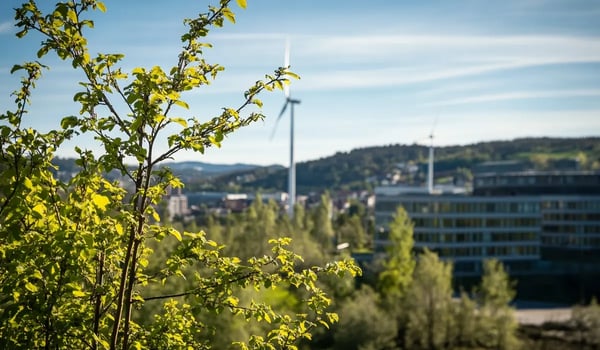The European Commission’s 2024 NextGenerationEU (NGEU) Green Bonds Allocation and Impact Report...
Hong Kong Emerges as a Key ESG Hub
Family offices are stepping up their role in sustainable finance, with new data showing widespread integration of environmental, social, and governance (ESG) strategies. Hong Kong, backed by government policy and strong market performance, is quickly becoming one of the leading destinations for ESG-driven capital.
 A family office gathering in Hong Kong, overlooking the city skyline and lush greenery. AI generated picture.
A family office gathering in Hong Kong, overlooking the city skyline and lush greenery. AI generated picture.
The Sustainable Finance Initiative (SFI) reports that 90% of family offices worldwide now include ESG principles in their portfolios. Nearly 20% allocate at least half their holdings to sustainable assets, while close to 60% commit 10% or more.
‘These results show real and genuine commitment to sustainable investment’, said Katy Yung, chief executive of SFI. ‘Family offices have not only maintained their focus but refined their strategies to capture both social impact and robust returns.’
Policy Momentum and Market Depth
Hong Kong’s ambitions to build itself into a global family office hub align closely with this momentum. The government has rolled out tax breaks, streamlined regulations, and mandated ESG disclosures for listed companies.
According to Tom Chan Pak-lam, permanent honourable president of the Institute of Securities Dealers, these measures have strengthened investor confidence. ‘The Hong Kong government has been promoting both family offices and sustainable investments in the city in recent years’, he said. ‘Disclosure rules make it easier for family offices to identify and assess potential ESG targets.’
Market conditions are also providing a boost. The Hang Seng Index has surged almost 30% so far in 2025, following an 18% gain last year. In the first eight months of this year, Hong Kong also reclaimed its title as the world’s largest IPO market, offering family offices both liquidity and scale for their ESG ambitions.
Shifting Priorities Toward Nature
The survey further revealed a change in preferred investment themes. Nature-based solutions—including reforestation, wetland restoration, and regenerative agriculture—have overtaken food and agriculture as the top priority for family offices, with healthcare ranking third.
‘The data suggests that while food security and health remain vital, capital owners are increasingly realising the power of natural regeneration—not only in securing long-term societal benefits, but also as a cost-effective and accessible climate solution’, the SFI report stated.
Asia-Pacific is the most attractive region for sustainable investment, with 42% of respondents placing it at the top of their list. Private equity and direct investments are the favoured vehicles, accounting for nearly half of allocations.
Outlook
With private wealth emerging as a decisive force in capital markets, its alignment with sustainability goals is reshaping global finance. Hong Kong, combining policy support with market infrastructure, is well-positioned to anchor this shift.
‘From last year’s early signals to this year’s robust and refined data, our findings highlight the dynamism and determination of family offices in Asia-Pacific’, Yung added.






